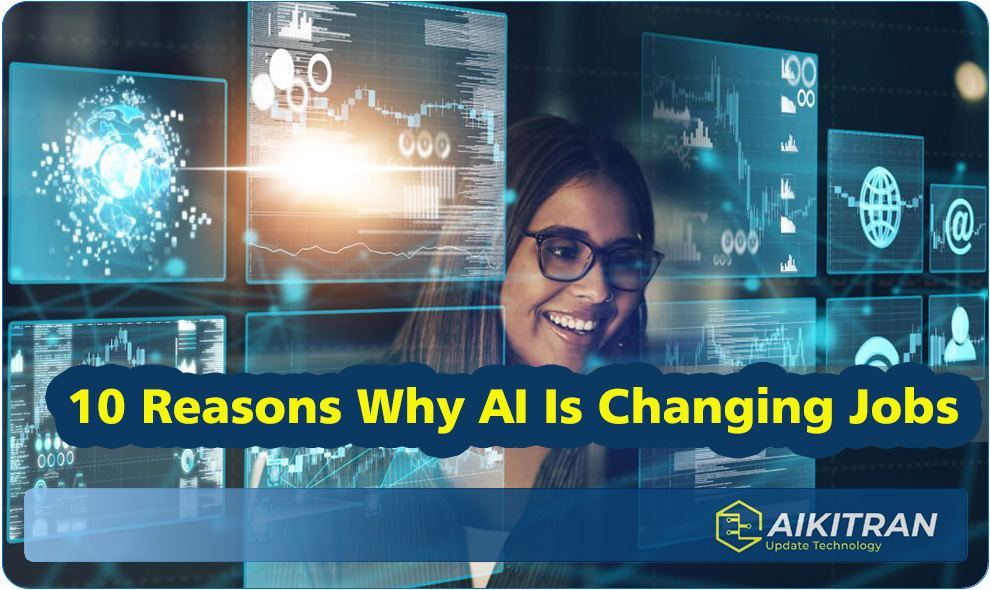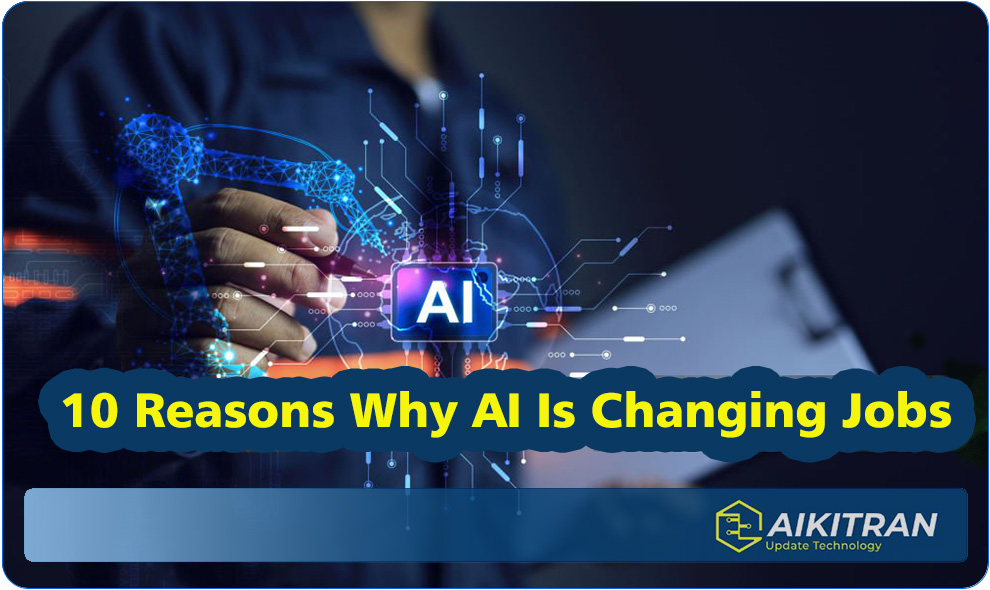10 Reasons Why AI Is Changing Jobs, Not Replacing Them
Why AI Is Changing Jobs: Many workers are worried about how AI will alter their jobs. Automation has begun taking over more tasks such as customer service and driving cars.
At McDonald’s drive-thrus and restaurants, self-ordering kiosks feature sleek robots to expedite service while self-learning AI tools help people write essays, take exams and generate news articles.

1. It’s not replacing you.
There has been much hysteria about AI replacing jobs, but in truth it will simply transform them. AI is taking on more of the mundane yet repetitive tasks that humans used to complete, thus freeing up more space for human workers to focus on creative, interpersonal and judgemental tasks.
ChatGPT can write fluent, syntactically correct code faster than most humans can write it – however if you’re an experienced coder who understands all aspects of his or her craft this shouldn’t be cause for alarm.
PR Managers possess an invaluable ability to create buzz about projects and brands by building relationships with influencers – something no robot could replicate. Furthermore, humans possess empathy that AI cannot.
2. It’s not replacing your job.
While AI may no longer pose as a direct threat to jobs, certain roles will certainly disappear as AI takes over certain tasks. On the upside, however, such tools allow workers to concentrate more creative and challenging work.
Example: A realtor who spends two to three hours writing the listing for a new property could use a generative AI tool that produces a first draft within 15 minutes, freeing her up time for meeting with clients instead of listing production.
Yet there are certain tasks which AI cannot fully take over, including professions such as law enforcement and politics that involve intensive social interactions and moral evaluation, as well as sports which demand agility and athleticism not matched by machines.
3. It’s not replacing your skills.
Though we may have witnessed videos of robotic workers at McDonald’s drive-thrus or self-checkout kiosks at grocery stores, artificial intelligence (AI) is also helping improve customer service – for instance many companies utilize chatbots to address common inquiries and requests from their clients.
AI does not replace human jobs; rather it just makes their tasks simpler for people. For instance, software engineers can now rely on AI for debugging code instead of reading blog post after blog post about its issues.
Human employees still need to acquire new skills; for example, understanding AI tools‘ training may become important to workers’ productivity. A worker without these abilities could risk being replaced by machines; therefore this issue must be taken seriously by policymakers; how will employees adjust when their boss has replaced them with an AI tool?

4. It’s not replacing your life.
There are still manual labor jobs that cannot be replaced by AI, like factory workers or bank tellers, yet many others could become at-risk of being replaced by AI.
Software engineers could see their jobs threatened by AI programs that can write code faster than humans, though most are concerned by generative AI’s inability to interpret what you ask it to do.
Because AI relies on correlation and pattern recognition to complete prompts, it cannot truly be empathetic or creative – nor make the best decisions that benefit all, which requires human intuition and empathy. Thus, roles like counseling, social work and healthcare cannot yet be replaced by AI.
You must read… SUPERB 4 NEW AI COPYWRITING TOOLS
5. It’s not replacing your health.
AI cannot perform jobs that involve manual labor or complex human interactions; for instance, being a plumber requires being adept at handling different pieces of equipment while having soft skills that enable them to interact with residents in order to resolve problems efficiently.
Similar to lawyers, legal advice requires an in-depth knowledge of morals and ethics; however, AI tools like voice assistants could potentially take over these tasks faster. They could also produce code faster than most humans could manage – two tasks which were traditionally performed by human lawyers.
But most who experience bias or unfair treatment on account of race or ethnicity believe AI will help improve things, not worsen them. This may be because AI’s data collection tools reflect existing bias and magnify inequality.
6. It’s not replacing your relationships.
Though some might worry that AI is taking their jobs away, in reality many jobs are simply changing and AI tools can assist workers to complete tasks quicker and more effectively than before.
Software engineers can utilize generative AI to expedite their computer-aided design process and save up to three hours a day with this approach.
Chatbots are also using AI technologies to streamline customer service and other administrative roles, helping staff save time while increasing productivity.
AI can reduce the time spent analyzing large data sets, providing an important advantage in industries reliant on big data. AI also enables improved targeting of messages and ads as well as personalized websites; saving shipping costs while improving customer satisfaction while decreasing inventory levels.
7. It’s not replacing your happiness.
Artificial intelligence has quickly become an integral component of customer service, from simple chatbots to more intricate backend analysis of data. But its aim should not be to replace humans but instead augment and supplement them in their work.
Meta (formerly Facebook) newsfeed leverages narrow AI, or systems meticulously tailored to perform specific tasks within narrow parameters, to curate content based on your interests and similarities with other users. This shows how weak AI can be used as an aid to enhance productivity and efficiency among human workers; but what will happen if these tools become more advanced? Will jobs be entirely replaced by AI? Probably not; here are some strategies you should employ when considering AI’s impact on future work: click here.
8. It’s not replacing your purpose.
AI will have an outsized influence on how businesses function, yet despite popular belief, it won’t replace your future either as an employee or company owner.
Generative AI is revolutionizing the creative process by helping those with limited linguistic or artistic capabilities produce results otherwise out of reach. This powerful tool is already being employed by music producers, writers and filmmakers.
According to the World Economic Forum’s 2023 Future of Jobs Report, office support, customer service, food services, production work and sales are areas most vulnerable to increased automation. But most workers who have already encountered AI say it has helped rather than hindered them – including investment bankers like Martha Yin and Niko Molina who told NBC New York they don’t feel threatened by it.
9. It’s not replacing your future.
Certain jobs cannot be replaced by AI, such as those requiring creativity, physical dexterity and judgment. Even for tasks that can be automated – like online customer support – human support may still be needed to escalate issues or provide detailed information for troubleshooting purposes.
One reason AI hasn’t taken over your job yet is due to how differently AI learns than humans do; for example, generative AI models focus more on patterns and correlations rather than causation.
Remembering AI’s expansionary nature, rather than replacement of jobs by robots is also essential to survival. Instead of worrying about losing your position to them, invest time and effort in learning new skills to take full advantage of tools in your workplace environment – lifelong learning has never been more crucial!
10. It’s not replacing your identity.
Concerns over AI replacing jobs has subsided a bit, yet some remain fearful that certain roles could be replaced by AI systems. But these fears may be misplaced.
One key reason that artificial intelligence (AI) does not yet surpass humans is due to its lack of emotional intelligence and empathy. Professions such as counseling, social work and healthcare require being able to empathize with others and offer help in the most efficient manner.
AI lacks the creativity required of most jobs and industries, which makes soft skills highly sought-after traits. For instance, while realtors might spend two or three hours writing property listings manually, Generative AI could take these same keywords and basic information and generate a first draft in just two minutes – freeing up more of their time for other tasks.